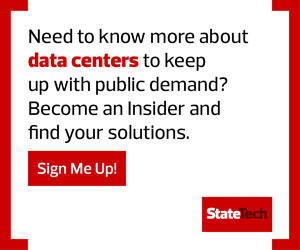Embrace the Concept of Open by Default
Instead of having closed systems and proprietary solutions, embrace open standards to enable more seamless interactions. Open standards enable data to be defined in common ways, meaning agencies can share information as necessary, but also with greater security. Plus, an agency can free itself from vendor lock-in and can more readily adopt innovative solutions.
Agencies can make structural changes as well. Open-source technologies powering containers and microservices can help accelerate the pace of innovation in an organization, enabling administrators to develop services and applications more quickly for both internal users and citizens.
Open source can also serve as an abstraction layer that ties together disparate hardware and software systems. This enables different agencies that may be using bespoke legacy systems to better communicate and share data with each other, orchestrate data between organizations, and replicate information between and amongst various government functions. Colleagues will be able to more easily pull and match citizens’ information as necessary.
EXPLORE: How leaders are sharing data and breaking down data silos to improve services.
Break Down Legacy Services to Digitalize
Numerous states have embarked on this path. Tennessee, for example, is adopting open-source platforms to modernize citizen services, especially in the realm of health and human services. California, Washington, North Carolina and Massachusetts are following similar courses.
Medicaid modernization is a great example of this. States are breaking down legacy systems into components that can be adapted, updated and managed more easily. They're using modern, API-based technologies to share information securely and safely across organizational boundaries.
In this model, citizens can access services more easily. For instance, it will be easier for newlyweds to establish a consistent and accurate identity across bureaucratic lines. Their experiences will align more closely with what they’re encountering commercially.
LEARN ABOUT: How 3G sunsetting will impact public safety.
Start Small Projects for Big Results
Agencies don’t need to adopt these processes all at once. In fact, it’s better to approach digitizing services in much the same way as building an application: iteratively, agilely and one piece at a time.
Begin by implementing the platform in which this newfound openness will play out — typically a cloud-based environment where the shared services will live. With that foundation in place, move over applications and services incrementally, testing along the way.
In a short time, open, cloud-based approach promises to ease the burden on agency administrators. Agency IT teams will benefit from no longer needing to support dozens of disconnected, monolithic systems. These unification efforts will help agencies deliver citizen services more effectively and efficiently.










